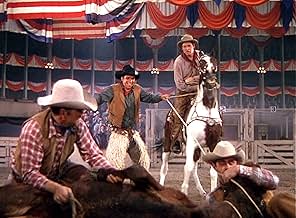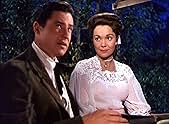The homespun humorist and social critic starts as a cowboy and goes on to vaudeville, movies, and radio.The homespun humorist and social critic starts as a cowboy and goes on to vaudeville, movies, and radio.The homespun humorist and social critic starts as a cowboy and goes on to vaudeville, movies, and radio.
Todd Karns
- 1st Mechanic
- (scenes deleted)
J. Carrol Naish
- Narrator
- (voice)
Dub Taylor
- Actor
- (scenes deleted)
Victor Adamson
- Townsman Greeting Will
- (uncredited)
Leon Alton
- Rodeo Spectator
- (uncredited)
Featured reviews
Most biopics leave a lot to be desired...especially those made during the classic era in Hollywood. Too often the actual lives of these heroes have been changed in order to make them seem more cinematic....and lying and twisting the facts is pretty much par for the course. Some films don't even have much to do with the actual person they are portraying (such as "Night and Day" and "Words and Music").
In light of this, I was shocked that for the most part "The Story of Will Rogers" is mostly the actual life and career of the man! Now I am not saying it's perfect, as for example, Will's father had died long before and the film must have assumed the man was a zombie! But apart from that and a few small items, the film IS the life of Will Rogers.
To play the man, the studio did something unusual. First, they consulted with Rogers' widow (why they actually wanted to get the facts right is beyond me!). Second, they got Rogers' son, Will Jr., to play him. Now Will Jr. Didn't look exactly like his dad (I think he actually looked more like Chill Wills), but he was pretty close and captured the man pretty well.
Why do I think they got Rogers' life right? Well, I think two reason account for this. First, Rogers DID so many amazing things that there wasn't the same need to embellish it to 'spice it up'. Second, as Rogers was such a public figure, had they NOT stuck to the facts, folks would have noticed.
So, overall it's a very good film and an excellent overview of the actor/humorist's life. Well worth seeing.
In light of this, I was shocked that for the most part "The Story of Will Rogers" is mostly the actual life and career of the man! Now I am not saying it's perfect, as for example, Will's father had died long before and the film must have assumed the man was a zombie! But apart from that and a few small items, the film IS the life of Will Rogers.
To play the man, the studio did something unusual. First, they consulted with Rogers' widow (why they actually wanted to get the facts right is beyond me!). Second, they got Rogers' son, Will Jr., to play him. Now Will Jr. Didn't look exactly like his dad (I think he actually looked more like Chill Wills), but he was pretty close and captured the man pretty well.
Why do I think they got Rogers' life right? Well, I think two reason account for this. First, Rogers DID so many amazing things that there wasn't the same need to embellish it to 'spice it up'. Second, as Rogers was such a public figure, had they NOT stuck to the facts, folks would have noticed.
So, overall it's a very good film and an excellent overview of the actor/humorist's life. Well worth seeing.
Will Rogers, Jr. stars as his own father Will Rogers in what many critics say is one of the best of movie biographies ever. Will, Jr. even asked that nothing be added to over-dramatize or embellish the storyline of the movie. He wanted his father to speak for himself. That's what they said on TCM. If you love film biographies, or like Jane Wyman, or if you have never heard of Will Rogers and want to know more about him, then you're in for a treat. Costarring James Gleason, Slim Pickens, Mary Wickes and Eddie Cantor as himself, this film has more heart and respect for its subject matter in one minute, than a lot of other movie biographies have in the whole film, especially musical biographies. This film shows how one man made a difference in the lives of others by being himself and that he is still being loved and remembered today.
Both Michael Curtiz and his longtime employer, Warner Brothers, showed a flair for biographies, and this one has been somewhat underrated. The story is the familiar one of the rise of a young man from obscurity to worldwide fame, and there are really no surprises here. Audiences at the time the movie came out (1952) probably knew much about Rogers' life anyway, though he is nowadays an almost forgotten figure. This movie is solid entertainment, nicely photographed in color, and Will Rogers, Jr. gives an excellent, engaging performance as his father. It is basically a series of cliches, which, once once accepts the premise, one can thoroughly delight in, as I did, as the skill with which such material is handled constitutes the pleasure of watching such a predictable movie as this.
Rogers was a huge star in vaudeville on Broadway and in the movies. He was also a newspaper columnist and radio commentator, and hugely popular in his day. His homespun humor has dated badly, but the rough and tumble world he came out of is fascinating to see recreated on screen. There are nice ironies in the movie, among them, Rogers' move from the "real west" (Oklahoma) to the "false west" (Hollywood). I also like the casting of the refined, almost patrician actor, Carl Benton Reid, as Rogers' father. The arrival of barnstorming aviator who lands literally in Rogers' backyard, is stunningly filmed, and one can't help get a lump in one's throat as soon as one learns his name: Wiley Post.
Rogers was a huge star in vaudeville on Broadway and in the movies. He was also a newspaper columnist and radio commentator, and hugely popular in his day. His homespun humor has dated badly, but the rough and tumble world he came out of is fascinating to see recreated on screen. There are nice ironies in the movie, among them, Rogers' move from the "real west" (Oklahoma) to the "false west" (Hollywood). I also like the casting of the refined, almost patrician actor, Carl Benton Reid, as Rogers' father. The arrival of barnstorming aviator who lands literally in Rogers' backyard, is stunningly filmed, and one can't help get a lump in one's throat as soon as one learns his name: Wiley Post.
When they discuss the great movies of director Michael Curtiz, they start with Casablanca, which may well be the greatest American movie - for which he earned a well-deserved Oscar - and go on to such screen gems as The Adventures of Robin Hood, Captain Blood, The Sea Hawk, Yankee Doodle Dandy (which is a slow movie with a great performance by its star), Life with Father, and a host of others. I doubt anyone would think to mention this movie.
And The Story of Will Rogers is not a great movie. It does not move with the relentless drive of Casablanca or Robin Hood, it does not sparkle like Life with Father. Seventeen years after his untimely death in 1935, it tells the story of the then still well-remembered American humorist, Will Rogers. Since everyone still knew his story then, the movie did not have to tell it; rather, it picked the moments that it wanted to stand out.
That isn't Rogers' years in the Ziegfeld Follies, which made him a household word, or his appearance in movies, even through, for a short while, he was the biggest box office attraction in talkies.
Rather, it concentrates on Rogers' support of General William (Billy) Mitchell and his efforts to get Congress to put money into air power at a time when the U.S. was pulling back into isolationism. World War II and the terrifying German blitzkrieg would eventually show that Mitchell and Rogers were right.
It also concentrates, in the last part, on Rogers' fund raising for the poor during the depths of the Depression. That, too, is an aspect of Rogers' career that is probably forgotten today.
This movie won't keep you glued to your seat. But it does serve to remind us, now that there are few among us who remember seeing and hearing Rogers, what warm-hearted pleasure he brought to Americans when so many of us needed a smile so badly. His sense of humor may seem corny today - it was corny back then, too - but there is a lack of nastiness or derision to it that I often miss today.
And The Story of Will Rogers is not a great movie. It does not move with the relentless drive of Casablanca or Robin Hood, it does not sparkle like Life with Father. Seventeen years after his untimely death in 1935, it tells the story of the then still well-remembered American humorist, Will Rogers. Since everyone still knew his story then, the movie did not have to tell it; rather, it picked the moments that it wanted to stand out.
That isn't Rogers' years in the Ziegfeld Follies, which made him a household word, or his appearance in movies, even through, for a short while, he was the biggest box office attraction in talkies.
Rather, it concentrates on Rogers' support of General William (Billy) Mitchell and his efforts to get Congress to put money into air power at a time when the U.S. was pulling back into isolationism. World War II and the terrifying German blitzkrieg would eventually show that Mitchell and Rogers were right.
It also concentrates, in the last part, on Rogers' fund raising for the poor during the depths of the Depression. That, too, is an aspect of Rogers' career that is probably forgotten today.
This movie won't keep you glued to your seat. But it does serve to remind us, now that there are few among us who remember seeing and hearing Rogers, what warm-hearted pleasure he brought to Americans when so many of us needed a smile so badly. His sense of humor may seem corny today - it was corny back then, too - but there is a lack of nastiness or derision to it that I often miss today.
This is an amazing tale of a person who lived and made his claim to fame in the early decades of the 20th century. There were so many apt points he made about politics that are spot on about our current political world. We could sure use someone like him now to take a bite out of the polarization we have now about political issues. He maintained that we all care about each other and that as long as we have that the U.S. will never go down. We could definitely benefit from such ideas today. Great movie, great cast. Will Rogers Jr. portraying his dad. Jane Wyman as the love of his life. Great family and feel good movie. I viewed it on TCM, if you get the chance, don't miss it!
Did you know
- TriviaThe real Eddie Cantor appears as himself in support of Will Rogers, Jr. who portrays his father, a contemporary of Cantor's. The next year Rogers, Jr. would return the favor, again appearing as his father in The Eddie Cantor Story. Both films were made by Warner Brothers.
- GoofsWhen Will Rogers is addressing the bankers at 1:17:00 in, there are 2 old style microphones on the table in front of him. The one on the left of the screen, Rogers' right, is missing one of the suspension springs between the mic cartridge and the frame. It also has no wire attached to it, so it couldn't possibly function.
- Quotes
Will Rogers: Well it looks like the women are finally gonna get the vote. A lot of men say they shouldn't be trusted with it. Seems kind of silly to stop trustin' them now after eatin' their cookin' for 4000 years.
- ConnectionsEdited from Rhapsodie en bleu (1945)
- SoundtracksHome on the Range
(uncredited)
Music by Daniel E. Kelley
Lyrics by Brewster M. Higley
Played at the beginning and during the opening credits
Sung at the Rogers party and used often in the score
Details
- Runtime1 hour 49 minutes
- Aspect ratio
- 1.37 : 1
Contribute to this page
Suggest an edit or add missing content

Top Gap
By what name was The Story of Will Rogers (1952) officially released in India in English?
Answer


































